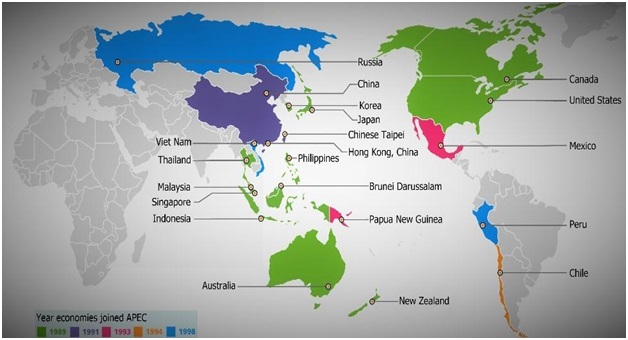What Is Asia-Pacific Economic Cooperation (APEC) And Why India Is Not A Member (Live Mint)

- 16 Nov 2023
Why is it in the News?
Union Minister Piyush Goyal is attending the Asia-Pacific Economic Cooperation meeting in the United States today, which will also see US President Joe Biden and his Chinese counterpart Xi Jinping hold their second in-person dialogue since Mr. Biden assumed office in 2021, amid tensions and a trust deficit between the two countries.
What is Asia Pacific Economic Cooperation (APEC)?
- The Asia-Pacific Economic Co-operation (APEC) is a regional economic forum and was formed in 1989.
- It is a grouping of economies around the Pacific Ocean that aims to promote trade, investment, and economic development in the region.
- The bloc is looking to “leverage the growing interdependence of the Asia-Pacific and create greater prosperity for the people of the region through regional economic integration”.
- APEC started with 12 members in 1989 but has over the years grown to 21, which includes the US, China, Russia, Japan, and Australia.
- The other members include Brunei, Hong Kong, New Zealand, Papua New Guinea, the Philippines, Indonesia, South Korea, Canada, Mexico, Peru, Chile, Malaysia, Vietnam, Singapore, Thailand and Taiwan.
- Taiwan and Hong Kong, which China stakes claim to as its territory, participate separately in the forum.
- APEC accounts for about 62 percent of global GDP and almost half of global trade and around 2.9 billion citizens.
- As of 2018, they represented 48 percent of global trade.
- It operates based on non-binding commitments with decisions reached by consensus and commitments undertaken voluntarily.
Why is India not a member of the APEC Group?
- India attempted to join APEC in 1991, the year the Indian economy was liberalised.
- A majority of the members of the grouping were in favour of India’s inclusion but some opposed it.
- They had reservations about India’s “protectionist instincts” and cited its records on the economic reforms.
- There was also a freeze on membership since 1997.
- However, it was not extended in 2012.
- In 2016, then Union Minister for Commerce and Industry Nirmala Sitharaman told Parliament that the request to join was based on India’s geographical location, the potential size of the economy, and the degree of trade interaction with the Asia-Pacific.
- India remains an observer of APEC and has been expanding trade and investment ties in the region since the 2000s.
- Among other factors, India’s lack of a Pacific coastline has worked against its membership in APEC, but the Indo-Pacific Economic Framework for Prosperity (IPEF) is clearly meant to give India a more central position, given the US focus on creating alternatives and counterweights to China’s economic influence.
How can India benefit from APEC membership?
- “Becoming an APEC member would bring several benefits for India, such as promoting closer economic relations, facilitating trade and investment flows, and opening market access to major economies.
- Aligning with APEC by simplifying and harmonizing trade procedures and regulations could boost India’s exports, attract foreign direct investment, and support domestic initiatives like ‘Make in India‘.
- A membership could encourage the country to “adopt best practices, streamline trade processes and reduce transaction costs”.
- It could facilitate “technology transfer” in important areas like information technology, pharmaceuticals, biotechnology, renewable energy and manufacturing.
- The membership will be helpful for improving flows of knowledge, capital, and goods within the region through better coordination of policies.
- Economies such as Japan and South Korea (members of both APEC and IPEF) are also important for India in terms of the technological and production know-how they can provide, as is Taiwan, which is only a member of APEC.
What is the Significance of APEC?
- Since its formation, the grouping championed the lowering of trade tariffs, free trade, and economic liberalisation.
- As per the US State Department, “During its first five years of operation, APEC established its core objectives.
- In the 1991 Seoul Declaration, APEC member economies proclaimed the creation of a liberalised free trade area around the Pacific Rim as the principle objective of the organisation.”
- The experts at the think tank Centre for Strategic and International Studies (CSIS), stated, “The dynamic growth attributable to APEC initiatives contributed significantly to the development of a growing middle class in the developing Asia-Pacific region.
Conclusion
India must independently pursue trade liberalization, excluding China to ease concerns. Multilateral coordination, more efficient than bilateral deals, is crucial. Empirical evidence emphasizes the clear positive impact of trade liberalization on Indian economic growth, surpassing other policy reforms. India's anxieties about trade openness may impede growth.
Engagement in institutions such as APEC and IPEF provides a platform for addressing and isolating these concerns. India's focused approach to trade liberalization is pivotal for navigating economic complexities and fostering meaningful international collaborations.
